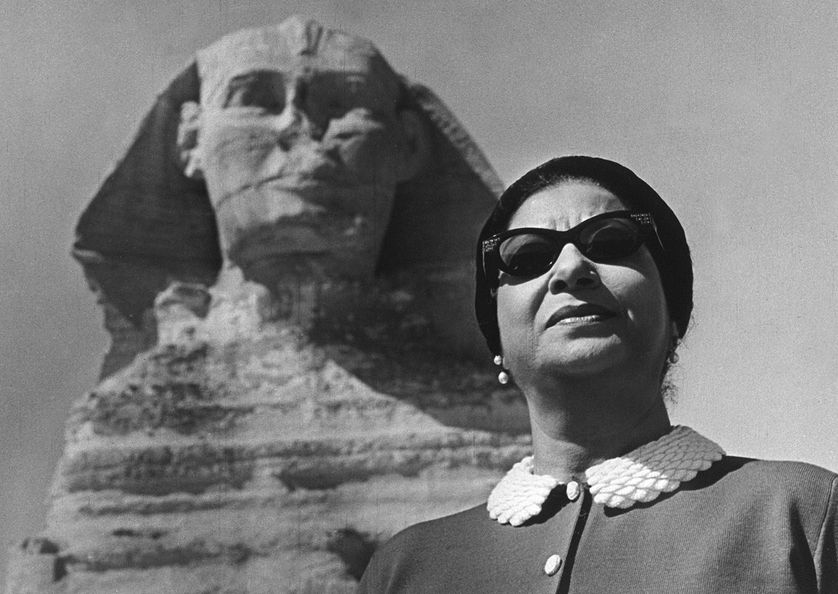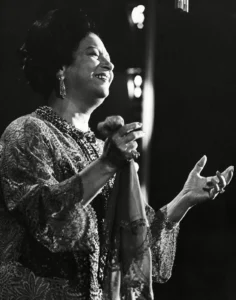Introduction to Umm Kulthum and Her Impact on Egyptian Culture
Umm Kulthum, born on December 31, 1904, in a small village in Egypt, is widely recognized as one of the most influential figures in Egyptian music and culture. Known for her powerful and emotive voice, she became an iconic singer, songwriter, and actress who significantly shaped the landscape of Arab music throughout the 20th century. Her career, which spanned over five decades, saw her rise to become a national symbol for not only Egyptians but also for millions across the Arab world.
Umm Kulthum’s unique vocal style was characterized by its deep emotional resonance and technical virtuosity, which allowed her to convey a range of feelings—from love and longing to joy and sorrow. This distinctive quality established her as a leading figure in the Arabic music scene, making her songs resonate deeply with audiences. Her ability to intertwine traditional Arabic music with modern influences reflected her commitment to innovation while remaining rooted in cultural authenticity, a balance that has inspired generations of artists.
Beyond her musical achievements, Umm Kulthum’s influence extended into the realm of national identity. Amidst the political and social changes in Egypt, her music became a source of pride and unity for Egyptians. During critical historical moments, her songs served as anthems, encapsulating collective hopes and struggles. Her role as a cultural ambassador, representing Egypt on international stages, further solidified her status as a beloved figure. Understanding her immense contributions is essential as we prepare to celebrate her legacy in 2025, emphasizing the importance of her impact on Egyptian and Arab culture.
The Grand Celebrations Planned for 2025
The year 2025 marks a significant milestone in the celebration of Umm Kulthum, Egypt’s cultural icon, as various events are set to unfold to honor her enduring legacy. The celebrations aim to engage a wide audience, both locally and internationally, through a series of concerts, exhibitions, and educational programs that explore her life and artistry. Notably, renowned musicians and artists from around the world are being invited to participate, ensuring that the festivities reflect the global impact of Umm Kulthum’s work.
Concerts are planned in iconic venues across Egypt, including the Cairo Opera House, where tribute performances will feature both modern interpretations of her music as well as traditional renditions. These events will showcase an array of talent, from local Egyptian artists to international stars, all paying homage to her influential sound. Additionally, collaboration with major music festivals will broaden the reach of these celebrations, providing an opportunity for diverse audiences to experience the richness of her contributions to music.
Exhibitions highlighting significant artifacts from Umm Kulthum’s life, including her costumes, awards, and personal belongings, are being organized in various cultural institutions. These exhibitions will offer insights into her journey, from her beginnings in a small village to becoming a celebrated international artist. Accompanying educational programs will be designed for schools and community centers, where students can learn about her impact on music and society, fostering a deeper appreciation for her work and its cultural significance.
Engaging the local community is a priority, and plans include interactive workshops where participants can learn about traditional Egyptian music styles, inspired by Umm Kulthum’s own unique sound. These initiatives aim to not only celebrate her artistry but also inspire a new generation of musicians. Thus, the year 2025 promises to be a remarkable tribute to Umm Kulthum, reaffirming her status as a monumental figure in the realm of not only Egyptian music but also global culture.
Umm Kulthum’s Influence on Modern Music and Art
Umm Kulthum, often referred to as the “Star of the East,” holds an unparalleled place in the pantheon of Egyptian music. Her influence extends far beyond the era in which she lived, pulsating through the veins of contemporary artists and the broader landscape of popular culture. Even decades after her passing, Umm Kulthum’s music resonates deeply with new generations, who are drawn to her powerful themes of love, patriotism, and resilience. These themes not only shaped the societal fabric of her time but remain poignant in today’s world.
Modern Egyptian musicians frequently cite Umm Kulthum as a significant source of inspiration, integrating her melodies and lyrical depth into their own compositions. This homage manifests in various forms, from direct musical references to the incorporation of her poetic themes into contemporary lyrics. Artists such as Mohamed Mounir and Amr Diab have expressed admiration for her innovations in music, which have influenced their own unique styles. Furthermore, her songs’ intricate structures and emotive storytelling have prompted a resurgence of interest in traditional Arabic music among today’s performers, fostering a bridge between classical and modern influences.
The visual arts, too, reflect Umm Kulthum’s enduring legacy. Contemporary painters and filmmakers draw upon her image and persona, exploring what it means to embody resilience and national pride through their works. Documentaries and biopics featuring her life continue to inspire creativity and highlight her significance in Egyptian culture. This ongoing engagement with Umm Kulthum’s artistic contributions underscores the necessity of preserving her legacy for future generations, ensuring that the powerful messages and emotions embedded in her work continue to thrive.
The Global Reach of Umm Kulthum’s Legacy
Umm Kulthum, often regarded as a cultural icon, has established an enduring legacy that transcends geographical boundaries and resonates profoundly with diverse audiences around the globe. Born in Egypt, this legendary singer and songwriter has become synonymous with Arabic music, and her powerful voice continues to evoke deep emotions in listeners from various backgrounds. This universal appeal can be attributed to her ability to convey complex feelings and narratives through her lyrics and vocal performance, thus bridging cultural divides.
Her influence extends beyond the confines of the Arabic-speaking world, as her music has inspired numerous international artists across different genres, including pop, jazz, and classical. Noteworthy musicians such as the renowned Spanish flamenco singer Paco de Lucía and the celebrated jazz artist Antonio Hart have acknowledged Umm Kulthum’s profound impact on their work. By embracing her music, these artists highlight how her contributions are invaluable in exploring the connections between Eastern and Western musical traditions.
In a world increasingly defined by globalization, understanding and appreciating cultural heritage has become vital. Umm Kulthum serves as a cultural ambassador for Egypt, showcasing the richness of Arabic music to new generations of listeners. Festivals, concerts, and various media initiatives dedicated to her work demonstrate the continued relevance of her artistry. Such efforts not only preserve her music but also encourage intercultural dialogue, reminding diverse audiences of the shared human experience that music fosters.
As we reflect on the remarkable journey of Umm Kulthum and her indelible mark on global music, it is essential to recognize and celebrate her contributions. Her legacy reinforces the importance of cultural appreciation, inviting us to engage with and learn from the rich tapestry of music that spans the globe.


